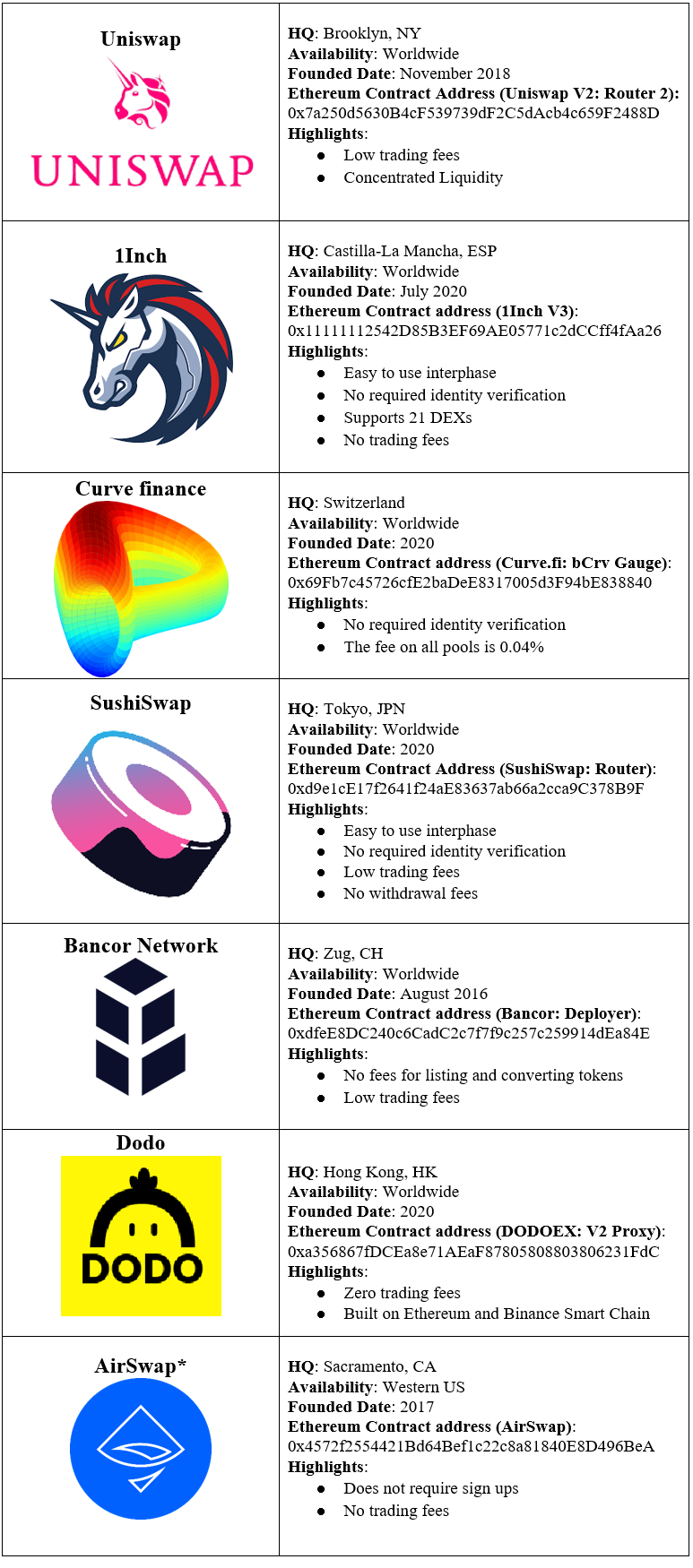Cryptocurrency Exchanges: A Guide to Smart Transactions
Introduction: An exchange is a place where buyers and sellers can match and set their orders, while these can be physical marketplaces, nowadays, most people exchange on digital platforms that facilitate this process (Kenton 2020; Kennon 2021). Particularly for cryptocurrencies, an exchange can be either centralized or decentralized and allow its users to buy and sell fiat currencies[1] or altcoins[2]. In a centralized exchange, a third party facilitates the transactions and offers security to its users’ funds (Cryptopedia). On the other hand, a decentralized exchange operates without a central authority, this is achieved by making use of peer-to-peer (P2P) trading (Wikipedia). In this article, we introduce the top 10 centralized and decentralized exchanges. Furthermore, we provide a decision tree that help users navigate to the best matched exchange based on five criteria: security, legality, anonymity, payment methods and supported tokens. We also provide examples that identify the limitations of this golden rule.
Figure 1. Bitcoin trading volume during 2020 by country.
Top 10 Exchanges: Centralized and Decentralized
We introduce the following exchanges sorted by exchange ranking as in CoinGecko on July 9th, 2021 [2].
Centralized Exchanges
 Table 1. Centralized Exchange
Table 1. Centralized Exchange
Decentralized Exchanges
 Table 2. Decentralized Exchanges
Table 2. Decentralized Exchanges
- Not listed in CoinGecko’s ranking.
How to choose the right exchange?
Cryptocurrency exchanges come in all kinds of forms, which is why it is important to consider some factors before choosing an exchange, such as:
● Security: Find reviews so that you know the platform is legitimate and safe, check if the deposits will be stored in cold storage (Cryptonews.com).
● Legality: if possible, try to choose an exchange that is based in your country or one that you are quite familiar with (Coolwallet.io).
● Anonymity: If anonymity and security are serious concerns for you, then a decentralized exchange with anonymous sign-ups should be your choice.
● Payment methods: Not all the exchanges allow their users to use credit or debit cards, some use PayPal or only allow trading using cryptocurrencies.
● Supported Coins and tokens: Most exchanges support Bitcoin and Ethereum but some other coins or tokens might not be available on every platform (Maishera 2021).

Figure 2. Top-10 centralized and top-10 decentralized exchanges according to CoinGeko on July 9th of 2021 clustered in different groups according to their features.
Limitations
Even though this decision tree could be useful for some traders, there are other features that one could consider in order to choose the best exchange for their interest, for instance, cybersecurity and liquidity; therefore:
- Exchanges like Gemini that do not seem very competitive could be preferred for their strong emphasis on security.
- Similarly, Crypto.com might seem a better option than Coinbase, but its liquidity is lower, it is not based in the US, and has been in the market for less time so its low fees could rather be an attempt to steal some users from Coinbase.
Relevant materials
[1] What is fiat currency?
Fiat money is a government-issued currency that is not backed by a physical commodity, such as gold or silver, but rather by the government that issued it.
[2] What are Altcoins?
Altcoins are cryptocurrencies other than Bitcoin. They share characteristics with Bitcoin but are also different from them in other ways.
[3] What is ACH Transfer?
The ACH is an electronic funds-transfer system run by NACHA. An ACH transfer is an electronic bank-to-bank transfer via ACH.
Author: Carlos Gustavo Salas, Summer Research Scholar at Duke Kunshan University 2021, on the Fintech project team lead by Prof. Luyao Zhang
This article is a deliverable out of the Summer Research Scholar Program
Acknowledgments
Design: Austen Li
Executive Editor: Xinyu Tian
Associate Editors: Lunji Zhu, Zichao Chen
Project lead and Chief Editor: Prof. Luyao Zhang